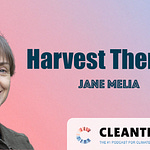Why you should listen:
Learn the tips of selling your tech to Utilities
How to consider equity and inclusion as you build
Hear Michael’s ideas of where to build in climate
Not already a subscriber…subscribe today and support us either financially or through sharing the post.
In this episode, Silas Mahner (@silasmahner) speaks with Mike Jung from the ICF Climate Center.
Given Mike's work across a wide variety of clients currently + his experience in the utility space, we had a lot of interesting things to talk about.
Of all the things, perhaps the most interesting, were his insights on selling to utilities. So, if you're selling to utilities, listen up this one is for you.
Enjoy the Episode! 🌎
📺 👀 Prefer to watch: subscribe on YouTube.
📫 Interested in written summaries and takeaways from the episode? Subscribe to the newsletter.
Want to be part of the community and engage further? Check out the Slack Channel. https://tinyurl.com/mwkn8zk5
Topics:
2:07 Introduction and career
15:55 What does ICF do?
25:09 utilities
28:24 on selling to utilities
32:22 selling to regulators?
37:47 showing consumer interest in getting the utilities to buy
40:23 Carrot or stick regulatory practices
45:23 The funding landscape
48:13 Advice to founders – be aware of equity and inclusion, be aware of how you are pitching your business, and be conscious of your storytelling to attract talent
54:08 Ideas to build in climate - Hard to Abate Sectors
57:28 Sweaty Climate Startups - Community Action Agencies
Show Summary:
Given Michael’s deep expertise working across, utilities, consulting, and a substantial part of his career in utilities, his insights around how to sell to utilities and the considerations to keep in mind while doing so, are by far the most valuable part of this conversation. The clip below gives you a bit of a taste.
Key Takeaways:
“Work in your camp make an impact there” - when Mike said this, it really hit me. There are a lot of folks looking to ‘work in climate’ when they could likely start making an impact in their current role. Consider this before looking for a job in climate (at least for now given the current job market).
Find ways to keep utilities in mind - they will have to replace the old infrastructure, electrify the future, and be aware of industrial electrification. These were some things that came to mind as he was talking and I think it’s a key 🗝️ to think about as you are building a climate tech startup. If you can solve their problem in a way they are familiar with, they will certainly become buyers.
32:22 Selling to utilities | This section was by far my favorite part of the discussion.
“Regulator is the buyer” - This may have been obvious to others but for me this was really insightful and gives me a new lense to look at the startups we advise.
#1 EV #2 building decarbonization #3 clean energy. Across these three areas, he sees the potential need to use a stick and not a carrot to incentivize adoption given that he sees a massive opportunity for adoption here.
~46:10 Storytelling to get talent. His point about using storytelling is really great. I think about how he pitched ICF in the intro - it took what most ppl would see as just another consultancy, and really pointed out the cool aspects of it. Consider this when pitching your startup from a talent perspective.
48.10 Be aware of how you are pitching. If you are pitching in a way that seems too ‘innovation-focused’ you might actually be tanking your chances because Utilities are meant to ‘keep the lights on’ not to ‘build fast and break things’. Consider the buyer during the pitch. Understand their needs well.
Equality and inclusion in your journey of building. Ensure you are considering this while you build. His thoughts on this made me remember again how poorly the climate tech revolution is partaking in making a more equitable outcome for so many underprivileged groups.
Focus on hard-to-abate sectors. (~52:00) He sees this as the biggest area for new startups. Look into this space, study it, and over the coming months, you might strike a golden opportunity to make an impact and a buck 💸.
~55.10 Community Action Agencies. This was quite interesting. Maybe not a hugely scalable startup, but if you understand the local area well and have a good network, you might be able to leverage that to build this to get buy-in from the community.
Links:
Check out our Sponsor, NextWave Partners: https://www.next-wavepartners.com/
Follow CleanTechies on LinkedIn: https://www.linkedin.com/company/clean-techies/
HMU on Twitter: @silasmahner
Resources / Events / Carveouts:
We wanted to start adding some of the other resources that we are aware of in the climate space each episode. These will not always be the same so be sure to check them out each episode.
Event: upcoming in November, on the 9th, CleanTechies will be hosting a meetup in Union Square in NYC. This will be an ongoing event on the 2nd Thursday of the month from 5-7 p.m. It’s a very chill objective for now and we will see how it goes. This is being hosted in partnership with 4Ward.VC.
You can join their community here. | Email Info@cleantechiespod.com to get on the invite.Voiz Academy: this is a community that helps you upskill and land a job at a climate tech company or a sustainability role. If interested you can check them out here:
Have a resource you use and want to share, send it our way info@cleantechiespod.com
Other episodes you might enjoy:
Most Recent Episode: #130 Financing Emerging Clean Technologies, The Incentive of Repeat Transactions, Hiring a Founding Team, & More w/ Kevin Kyer (Pyrpose.io)
Similar Topic: Helping Utilities Utilize Wasted Data with Sean Murphy of PingThings
Something Totally Different: #116 Consultative VC, Understanding Customers (as a VC), Developing Industry Networks for Your PortCos, & More w/ Rick Zullo (Equal Ventures)














Share this post